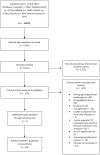Children and young people's experiences and perceptions of self-management of type 1 diabetes: A qualitative meta-synthesis
- PMID: 31555459
- PMCID: PMC6751535
- DOI: 10.1177/2055102919877105
Children and young people's experiences and perceptions of self-management of type 1 diabetes: A qualitative meta-synthesis
Abstract
The aim of this review was to conduct a meta-synthesis of the experiences and perceptions of self-management of type 1 diabetes of children and young people living with type 1 diabetes (CYPDs). Six databases were systematically searched for studies with qualitative findings relevant to CYPDs' (aged 8-18 years) experiences of self-management. A thematic synthesis approach was used to combine articles and identify analytical themes. Forty articles met the inclusion criteria. Two analytical themes important to CYPDs' experiences and perceptions of self-management were identified: (1) negotiating independence and (2) feeling in control. The synthesis contributes to knowledge on contextual factors underpinning self-management and what facilitates or impedes transition towards autonomous self-management for CYPDs.
Keywords: meta-synthesis; paediatric; qualitative research; self-management; type 1 diabetes.
Conflict of interest statement
Declaration of conflicting interests: The author(s) declared no potential conflicts of interest with respect to the research, authorship and/or publication of this article.
Figures
References
-
- Audulv Å, Norbergh KG, Asplund K, et al. (2009) An ongoing process of inner negotiation – A Grounded Theory study of self-management among people living with chronic illness. Journal of Nursing and Healthcare of Chronic Illness 1(4): 283–293.
-
- Babler E, Strickland CJ. (2016) Helping adolescents with type 1 diabetes ‘figure it out’. Journal of Pediatric Nursing 31(2): 123–131. - PubMed
-
- Barlow J, Wright C, Sheasby J, et al. (2002) Self-management approaches for people with chronic conditions: A review. Patient Education and Counseling 48(2): 177–187. - PubMed
Publication types
LinkOut - more resources
Full Text Sources
Miscellaneous


